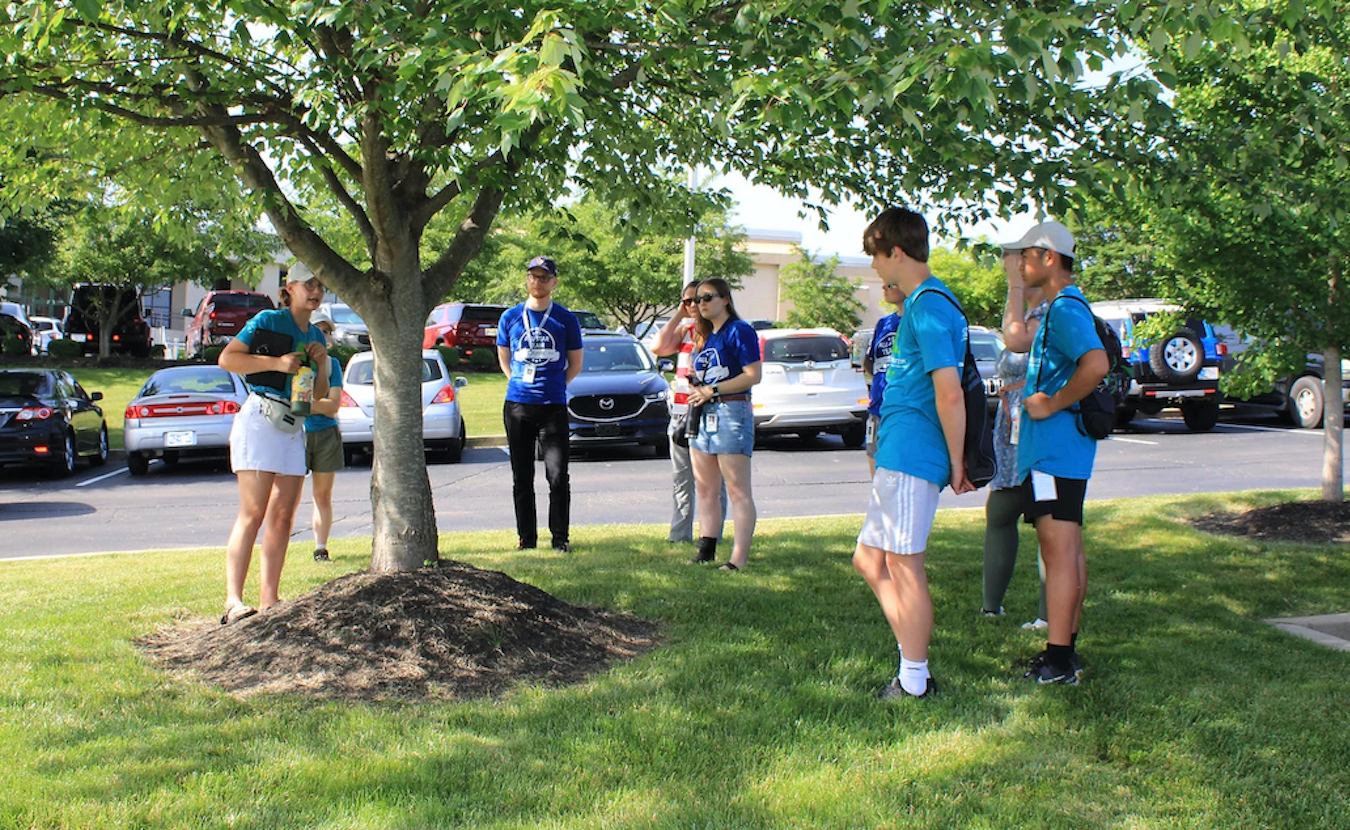—Sponsor Article—
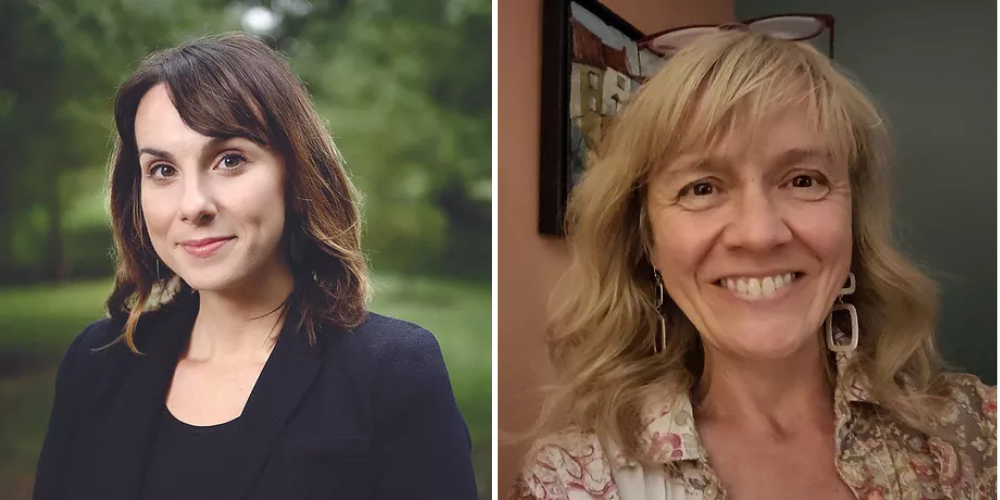
Dr. Sarah Mincey (left) and Sheryl Woodhouse founded CanopyBloomington in 2021 to address Bloomington’s decreasing tree canopy. Over the last ten years, Bloomington’s overall tree canopy has significantly and continually declined due in part to development, disease, pests, and climate change.
According to the 2019 Bloomington Tree Canopy Report prepared by the Davey Resource Group, almost 20% of Bloomington’s trees are in “poor” health, with another 35% considered to be only in “fair” health. Over the last ten years, Bloomington’s overall tree canopy has significantly and continually declined due in part to development, disease, pests, and climate change. Many of the trees lost over the last decade have been on private property — owned by businesses, residents, and landlords.
When faced with this alarming data, Dr. Sarah Mincey and Sheryl Woodhouse knew they wanted to create an organization to address Bloomington’s decreasing tree canopy. Mincey is an urban forestry professor at Indiana University’s O’Neill School of Public and Environmental Affairs (SPEA) and managing director of the Environmental Resilience Institute, whose research includes urban forest organizations and tree equity. Woodhouse is a local entrepreneur who has started and grown several businesses with an eye on sustainability and social impact.
While navigating the pandemic in the winter of 2020, Mincey and Woodhouse formed CanopyBloomington Inc. over numerous Zoom meetings, and they officially incorporated it as a 501(c)(3) organization in 2021.
Woodhouse says, “Without dedication and active community engagement in planning and caring for our urban forest, the quality of life we enjoy in Bloomington will steadily decrease.
“Most people understand that trees are critical in addressing climate change,” Woodhouse says. “They are less likely to realize the tangible mental and physical health benefits trees provide or that Bloomington’s urban forest produces real benefits equivalent to millions of dollars annually. Trees slow stormwater and prevent flooding, shade our homes and buildings, reducing heating and cooling costs, and even increase business in our stores.”
An Equitable Tree City
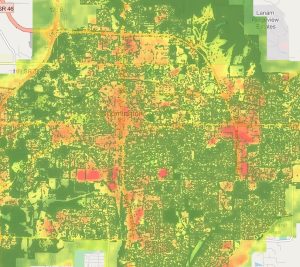
This map shows urban heat islands in Bloomington, using data from IU’s Environmental Resilience Institute. Urban heat islands can be attributed to more impermeable surfaces and buildings that absorb and retain heat.
CanopyBloomington’s mission is to grow and sustainably manage Bloomington’s urban forest for the many environmental, health, economic, social, and quality-of-life benefits of trees. Their mission includes a strong focus on tree equity, community engagement, and education, as well as boosting climate resiliency.
Canopy envisions an equitable tree city to ensure our urban forest can be enjoyed by all residents, regardless of race or socioeconomic status, and that the accompanying benefits that address climate and social inequities will be sustained for future generations.
In addition to general tree canopy decline, there are areas in Bloomington that already have inadequate canopy cover and therefore are deficient in the quantifiable benefits of trees. According to recent data from the U.S. Census Bureau, neighborhoods, multifamily residences, and other areas in Bloomington that have lower socioeconomic statuses tend to have lower canopy cover.
To ensure their plantings are data-driven and work towards achieving tree equity, Canopy uses the 2019 Bloomington Tree Canopy Report, 2021 American Community Survey Data, and additional environmental data to identify priority planting locations. Their spatial analysis assesses urban heat island effect, proximity to hardscape and existing canopy, floodplain data, slope, soil permeability, erosion potential, population density, and race and income distribution to create a combined metric. There is growing evidence that sufficient tree cover can help alleviate socioeconomic inequities.
In 2021, Mincey and Woodhouse brought on Hannah Gregory, an O’Neill graduate with extensive urban forestry knowledge and experience, as their Forestry Director, and Morgan Hicks as their Administrative Director to begin tackling Bloomington’s mounting canopy concerns. They also formed a robust Board of Directors to help provide the guidance and resources needed to ensure the organization’s success.
In its first years of operation, Gregory and Hicks have overseen Canopy’s two main programs: Community Tree Plantings and Youth Tree Tenders.
Community Tree Plantings
In October 2021, CanopyBloomington partnered with the City of Bloomington for their inaugural planting event in the Matlock Heights neighborhood. While the City planted trees in the right of way, Canopy reached out to homeowners to plant trees on private property. Canopy then collaborated with local volunteer group The Neighborhood Planting Project to plant trees in the Maple Heights neighborhood for their next major planting event in April of 2022. This was quickly followed by several additional plantings throughout the city, including for Bloomington Developmental Learning Center, First United Church, Tandem Birth Center, and Habitat for Humanity.
Youth Tree Tenders
In the summer of 2022, Canopy launched their Youth Tree Tenders program (YTT). The pilot year of this exciting program was generously supported by the Community Foundation of Bloomington and Monroe County. The YTT program is a paid work opportunity for high-schoolers in Bloomington that provides education and training to teens on the benefits of trees and why it is necessary to care for them. The program also allows participants to apply their knowledge in the field through tree plantings and maintenance. In addition to planting, pruning, watering, and mulching trees, Canopy arranged for a variety of enrichment days for their first YTT participants, including several guest speakers and field trips. To ensure that there would be ample work for YTT this year, Canopy made arrangements in partnership with the City to complete work on hundreds of trees in Switchyard Park.
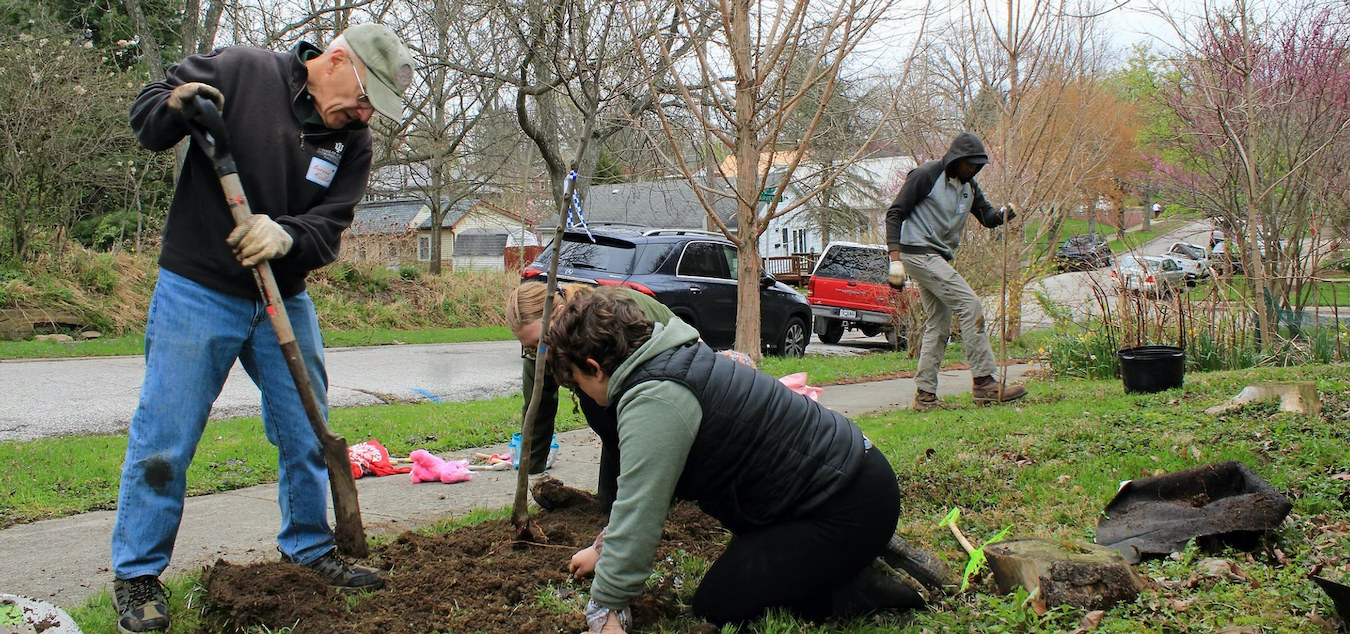
Neighborhoods can host CanopyBloomington for a free tree planting event, and businesses, nonprofits, schools, places of worship, and other businesses can partner with CanopyBloomington for free planting projects. Planting events and projects will be prioritized in target block groups and/or within high and very high priority sites as designated on the CanopyBloomington website.
Successful Collaborations
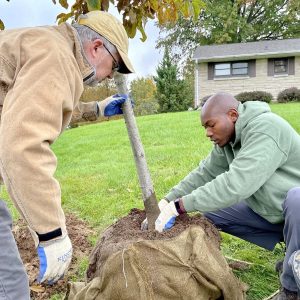
CanopyBloomington plants sizable trees (1-2” in diameter, 6-7’ tall), which have a significantly higher survivability rate than tree saplings.
Working alongside the City of Bloomington has proven to be an important element of Canopy’s work in their first years of operation.
According to Burney Fischer, Clinical Professor Emeritus, O’Neill SPEA & Bloomington Urban Forestry Research Group, Indiana University, “The most successful urban forestry programs are an ongoing collaboration among city government and the community (think neighborhoods, businesses, etc.), and a linkage to really make this happen is an active non-government lead like CanopyBloomington, that which had been lacking in the Bloomington community.” Fischer currently sits on the board of directors of Canopy and formerly served as Indiana’s State Forester.
While there are other organizations in Bloomington doing phenomenal environmental work, Canopy is unique in that they are doing work specific to urban forestry. Bloomington’s urban forest is the most abundant form of urban green infrastructure in our city but lacks the management required and resources needed to sustain and grow it effectively. The trees that Canopy plants are sizable (1-2” in diameter, 6-7’ tall) and provide immediate benefits that will continue to be maximized as they grow.
Planting larger trees, although more expensive, is a better investment because they have a significantly higher survivability rate than tree saplings, which are often planted as part of comparable residential tree-planting programs. Canopy sources their trees from Woody Warehouse Nursery in Lizton, Indiana. Woody Warehouse focuses on growing native trees from seed and monitoring the trees at all stages of growth to ensure that they have a strong and healthy root structure.
CanopyBloomington’s Commitment
For the first three years after planting, Canopy commits to mulching, pruning, and installing the necessary tree guards and stakes for tree recipients. They only ask that tree recipients ensure their trees are properly watered, especially in the hot summer months.
Although it is a large undertaking to be responsible for so many trees around the city, the first three years after a tree is planted are the most essential in terms of survivability rates. Canopy not only wants to plant trees to grow and maintain our tree canopy, but they also want to do everything they can to make sure that the trees they do plant thrive so they can provide their numerous environmental, physical, mental, and economic benefits to everyone in Bloomington.
So how can you help to ensure that everyone in Bloomington has access to trees and their benefits for generations to come?
CanopyBloomington is always in need of volunteers, donations, and people interested in planting trees at their home, business, nonprofits, places of worship, and schools. If you are interested in learning more or having Canopy speak to your group or club, you can reach out to them at hello@canopybloomington.org and follow them on Instagram and Facebook @canopybloomington.

